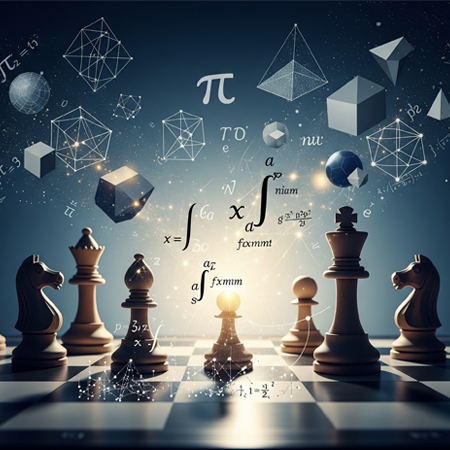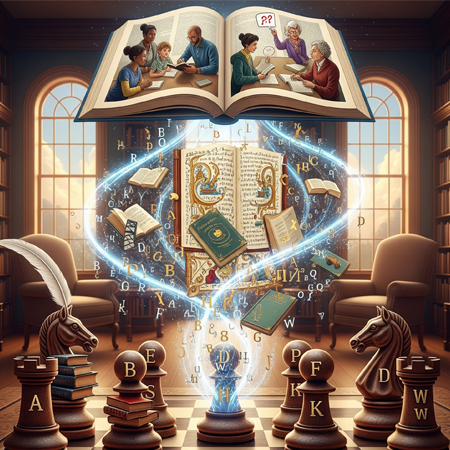Chess is often praised as a game of strategy, logic, and patience but it’s so much more than that. When thoughtfully introduced, chess becomes a dynamic educational tool that connects naturally with subjects like math, language, science, history, and art. It promotes critical thinking, emotional intelligence, and cross-disciplinary learning in a way few other activities can. The joy of learning through chess is genuinely inspiring and can ignite a passion for education in children.
At Delighted Champs, we believe in using chess not just as a standalone enrichment tool, but as a powerful bridge to deeper academic and personal growth.
Let's explore how chess can be integrated into various areas of learning both in the classroom and at home.
Chess and Mathematics: A Natural Partnership
Chess and math go hand in hand. The game is full of patterns, calculations, and spatial reasoning, making it a playful gateway into mathematical thinking.
- Counting and Coordinates: The chessboard introduces kids to grids and coordinate systems, laying the foundation for geometry and graphing.
- Logical Reasoning: Evaluating multiple move options mirrors arithmetic logic and early algebraic thinking.
- Pattern Recognition: Recognizing openings and tactics builds the same skill set used in number patterns and sequences.
For example, math-based chess puzzles could involve calculating the number of possible moves in a given position, or scoring systems could be designed to reward strategic thinking. Timed move challenges could be set up to encourage quick and accurate decision-making. These activities turn problem-solving into an engaging, gamified experience.


Enhancing Language and Literacy Through Chess
Though it’s known for strategy, chess also enriches language development. At Delighted Champs, we often pair chess with literacy activities to promote creative and analytical expression.
- Storytelling: Children can write stories from the perspective of a knight or pawn, blending imagination with narrative structure.
- Chess Journals: Reflecting on games and strategies in writing enhances self-expression and writing fluency.
- Vocabulary Building: Unique terms like castling, checkmate, or en passant expand children’s language and comprehension skills.
These activities not only improve literacy but also encourage self-reflection and deeper engagement with the game.
Chess and Art: Visual Imagination at Play
The aesthetic and symbolic aspects of chess lend themselves well to visual creativity. Art projects based on chess bring abstract strategy to life.
- Design Your Own Chess Set: Children can create pieces from clay, cardboard, or digital tools—fueling imagination and design thinking.
- Chessboard Art: Exploring color, symmetry, and cultural designs introduces elements of math and history through artistic expression.
- Comics and Illustrations: Drawing key moments or creating comics about chess matches adds a playful visual dimension.
Art-based integrations make the game more accessible, especially for visual learners who thrive on color, form, and storytelling.


Chess and History: Exploring the Game’s Roots
Chess has a rich and global history that stretches across continents and centuries. Incorporating this background into history lessons fosters cultural appreciation and curiosity.
- Timeline Projects: Research the evolution of chess from India to Persia to Europe, examining how the game adapted across eras.
- Cultural Studies: Explore how different regions developed their own strategies, styles, and iconic players.
- Historical Roleplay: Students can reenact famous matches or imagine themselves as royal advisors during medieval times.
At Delighted Champs, we encourage young learners to see chess not just as a game, but as a window into the past.
Chess and Science: Strategy Meets Inquiry
Chess may not be the first thing that comes to mind when thinking about science, but its structured logic aligns closely with scientific inquiry.
- Brain Science: Learning how chess impacts memory and cognition introduces children to neuroscience in relatable ways.
- Experiments and Data: Kids can analyze their own games, track win rates of specific openings, and visualize results using graphs—introducing basic statistics.
- Systems Thinking: Chess helps children understand cause and effect, feedback loops, and complex decision-making—foundational in STEM thinking.
These connections empower students to think critically and test hypotheses, just like scientists do.


Social and Emotional Learning Through Chess
Beyond academics, chess supports emotional growth and social development.
- Handling Wins and Losses: Children learn to process both success and failure with grace, resilience, and maturity.
- Focus and Patience: Chess strengthens attention span and delayed gratification, both vital for self-regulation.
- Peer Collaboration: Teaching others, playing in groups, or engaging in tournaments nurtures communication and empathy.
At Delighted Champs, we view chess as a medium for character-building just as much as brain-building. Chess plays a crucial role in nurturing empathetic hearts, teaching children to understand and respect their peers, and fostering a sense of community.
Creative Activities for Home or Classroom
Here are a few fun and effective ways to integrate chess across learning areas:
- Chess Story Time: Combine creative storytelling with short games based on characters and fantasy.
- Math + Chess Hour: Pose puzzles like “How many squares are on the board?” or “What’s the shortest path to checkmate?”
- Art + Chess Friday: Let kids draw custom characters for each piece or redesign a themed board.
- History + Chess Quests: Assign famous players for research, debate, or dramatic reenactments.
These playful integrations make learning feel seamless and joyful—while reinforcing core educational concepts.
The Future of Integrated Chess Education
As learning becomes more interdisciplinary, chess is emerging as a standout tool for blended education. Whether a child leans toward numbers, stories, art, or facts, chess offers a meaningful entry point into each subject area.
At Delighted Champs, we’re committed to using chess as a holistic educational platform—one that nurtures curious minds, empathetic hearts, and future-ready thinkers. Chess is not just a game, but a powerful tool that equips children with the skills and mindset they need to thrive in the future.
By weaving chess into everyday learning, we help children develop not only intellectual skills but also emotional intelligence and a lifelong love of learning.




